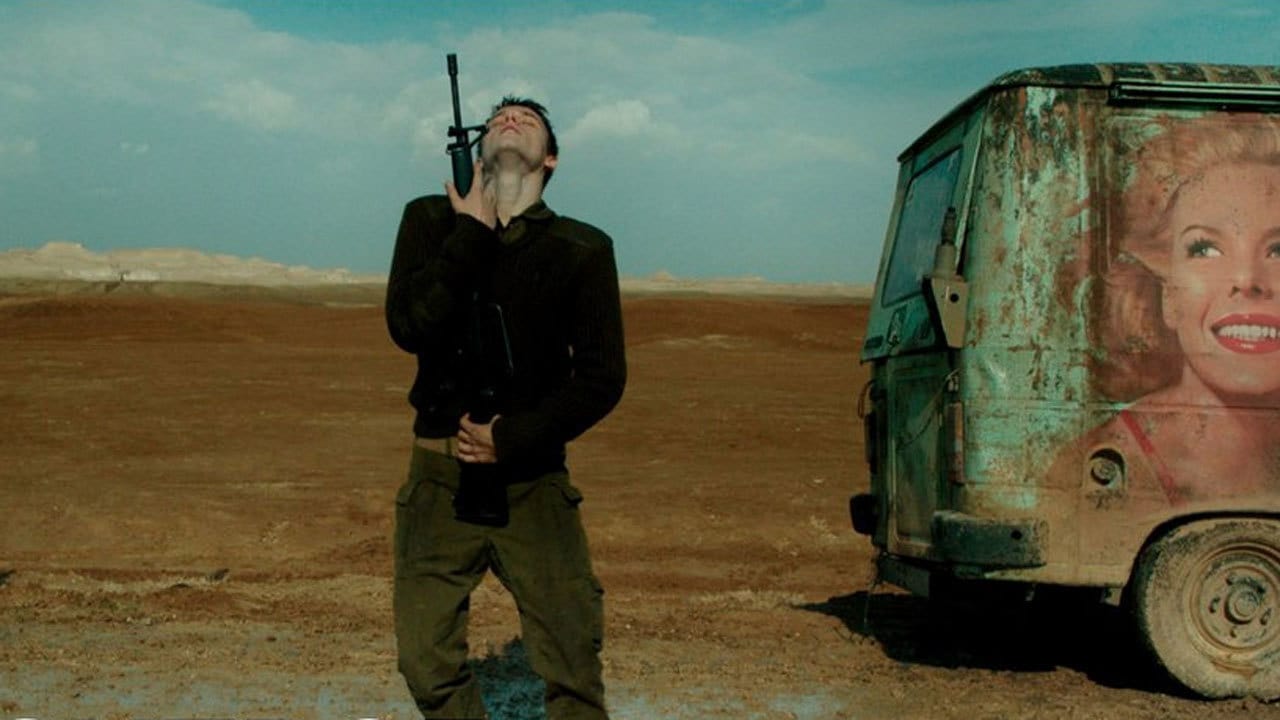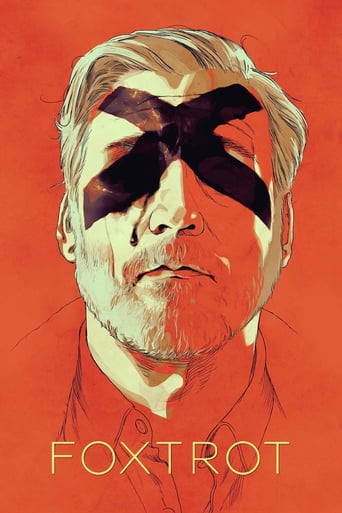

Https://dixonsbl0g.blogspot.com/2018/04/new-movie-review-foxtrot.htmlFoxtrot is an Israeli movie that begins as an analysis of grief and evolves into something much more. The opening scene shows Israeli soldiers informing a couple that their son has been killed in the line of duty. The film then begins to analyze the couples' reaction. This concept would be enough for most movies, but Foxtrot is not content to accept that a soldier's death is just a part of life. It yearns to discover the societal and familial causes that created this unnecessary tragedy.I don't want to give too much away, so I'll keep this brief. The movie evolves into a fascinatingly complex think piece that is better to witness than to hear second-hand. Yes, it's a study of grief, but it's also a satirical thesis on the pointlessness of war. It's an analysis of how an individual's flaws echo through generations. It points a finger at the "shoot first, ask questions later" policies of the police. It questions the religious traditions that hold together the fabric of society.All of these themes are studied in the context of the foxtrot - a dance that always ends in the same place that it began. The film comes to the beautifully depressing conclusion that none of these problems can be solved. Or at least that none of these problems have been solved, despite multiple generations living through them. No matter what we do, we always end up in the same place.
... View MoreThe loss of a child can bring unspeakable sorrow, caught in its essence by Samuel Moaz's Foxtrot a stunning study of an Israeli family's tragedy. Their fallen son is not just the Feldman family's loss; it can be an emblem of the Israeli storied toughness set against the absurdity of its fight and the cost to a relatively small but prominent world population.Basically a tripartite film, Foxtrot's first section languishes with the father, Michael (Lior Ashkenazi), as he responds to the universal call of two soldiers coming up their sidewalk, announcing the death to a fainting mother, Daphna (Sarah Adler). Moaz's shots are largely close up and over head both intended for us to feel his pain and his alienation. Never do these shots seem artsy; they are where we would be if we could enter Michael's space and view him from a judgment pov. For the second part, which shows the son, Jonathan (Yonotan Shiray), at a desert outpost, the camera is more distant and the light much brighter. As the narrative shows a soldier dancing with a rifle and an animated black and white sequence accompanied by a suckled breast, the tone has changed to playful and absurd. This airy sequence is appropriately comical to heighten the daily tragedies.Part three is the natural outcome of grief, itself accompanied by the foxtrot of the title, a simple dance to counter the daunting complexity of death and its aftermath. The film is a study of loss and grief exacerbated by a gritty culture that does not negotiate with the enemy and constantly deals with the Holocaust in its grief-laden memory.All this and more is in a remarkably deep and sometimes light study of war and its outcomes. Foxtrot was Israel's entry in the Oscar sweepstakes this year and deserving its considerable attention.
... View MoreThis highly acclaimed drama from Israel is a thoughtful and deep reflection on how we perceive of the scars that grief and guilt can leave on us. The film follows a patriarch and his wife who are told at the beginning of the film by Israeli army officers that their son was killed in the line of duty. These two parents begin to embark on a seemingly hellish grieving process...for the first 30 minutes. I won't give away what happens next, but the film ends up taking a variety of unique twists and turns through three distinct parts similar to that of a triptych-style narrative. It's not quite what you think it is, that's for sure.The acting in the film is consistently excellent, particularly the performance of the father. He manages to engage the audience in his seething feelings of sadness and an almost-primal sensation of rage, while still feeling uniquely down-to-earth and relatable. This is an almost impossible trick to pull off. Samuel Maoz clearly knows how to write thoughtful analysis of the society and people of Israel, with a clockwork level of precision--and props to him for that. The pacing in the film's three acts, however, could have been improved and can feel somewhat erratic in the movie's second half. Additionally, the finale of the movie is done in a somewhat peculiar manner that falls a bit short of what would most satisfy the viewer in terms of wrapping up the story. Still, I definitely recommend "Foxtrot" to those interested and thought this was quite a well-made film at the end of the day. 7.5/10
... View MoreNot only that there is no such thing as bad advertising, but bad advertising can help a lot. The success (public, critics, festivals) of Samuel Maoz's second film 'Foxtrot' may become at some point an example in the text books of cinema and public relations. The critics in Israel (including the Minister of Culture whose office actually supported financially the making of the film) who have trashed the film for its political attitude without seriously discussing it and (some of them, probably) without seeing it just succeeded to create a big fuzz around 'Foxtrot' which will make many Israeli film fans go and see it, and may also draw the attention and increase the international interest. Will the viewers be rewarded with an exceptional cinema experience? Not in my opinion. It's not a bad film, but it also has many disputable parts, and I am not referring only to the political approach. Will it win it an Academy Award? I very much doubt it will even make it through the selection, although, of course, I will be glad to be proved wrong.The film is built of three different parts, somehow like the three acts of a theater play. They may well be each of them a separate movies, as there are different leading themes in each of the acts, although they are interconnected. The first and the last part takes place in the house of the parents of a soldier, the middle one describes him and his comrades at the location where they are on duty, a a security checkpoint, someplace in an almost lunar landscape, that started to erode and decompose. A quote from Andrei Tarkovsky's Stalker comes to mind immediately, it's just that the natural disaster around symbolizes the more universal disaster that is ongoing. I liked especially the first part, which describes so well the nightmare that any Israeli parent who sent his kids to the army fears more than anything else in the world. At some point in time the story breaks and the worse news received by the parents turn to something different and behind their grieving are hidden more darker secrets. The second part includes the problematic scenes and the least that can be said is that the story of the soldiers just out of their childhood put into the impossible situation of policing the local population in the occupied areas is told from a very programmatic point of view. Can such incidents happen in reality? Hard to believe IMO, but they deserve a discussion, and the discussion should be about the events and not about the right to show them on screen. The last part takes us back to the parents home, and the critical approach now shifts against the mid-class Tel Aviv families busy with their neurotics and their own mean small personal traumas, unable to face reality and hiding themselves behind the smoke of grass.The three episodes have each their merits and their lose points, but they hardly come together, as each seems to carry its own message or more than one. Grief dominates the first, youth faced with war and politics dominate the second, escapism is the main theme of the third. It's a world that seems to have a hard time coming together, and so do the messages of this film that lack shared coherence. The film is full of symbols, too many, some quite good (the road leading to nowhere), some too obvious (the mud, the reclining cabin), some re-circulated from other movies trying to make the parts come together without really succeeding (the camel). When they try to be direct, the makers of the film failed, as in the schematic representation of the soldiers, the local population, and the relation between them. Lior Ashkenazi is fantastic in the first part, but his acting falls into mannerism and is less convincing later. Sarah Adler is a semi-miscast, too young for the role, spends much of the first part under sedation and never lets us understand her relationship with the father or the son. Overall my feeling was that this ambitious film failed in many respects because it tries to say too much and lacks one leading thread. As the dance in the title the story goes ahead, aside, and back, to return to the point where it started. It is still very much a film worth to see, even if some of the viewers will get to see it because of the wrong reasons, while some other will avoid it because of the same wrong reasons.
... View More